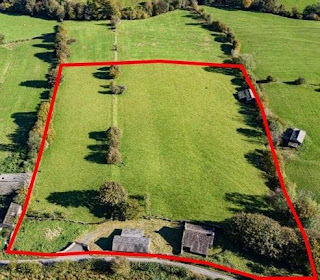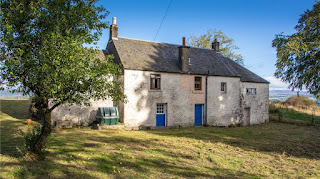This is by way of a holding post. A sign that I've pretty much drifted away from Wreck (as regular readers will have noted) but haven't quite let go of the idea of old-lady-gone houses, neglected beauties, and the dreamscape of space and peace Wreck represents.
So, this is a page to bookmark. Here's the amalgamation of everything I've learned from 12 years of finding amazing, interesting or weirdly wonderful properties to help you in your own search.
1. You're not looking for a "forever home"
It's a nice marketing concept but the reality is that what you need from a home will change over time and the likelihood of finding one property that will work for every change you'll live through is pretty remote. Today you may desperate for a remote, off-grid escape from city living, tomorrow you might mostly want a hip replacement.
Exhibit A: This handsome farmhouse and barns (separated by a road) on the Orkney coastline at Burwick, sent to me by reader Elizabeth. Offers over £125k, details and lots of pictures here.
2. Don't buy to your funds limit
Don't spend every penny and max the cards on a do-up, unless the people who will live in it with you are equally committed to living in a caravan/hut and spending every weekend doing the doing-up.
And definitely don't spend your savings and max the cards on a second home or home-to-let do-up. Friend, this is the wrong country at the wrong time right now for that sort of financial risk.
I've featured many unfinished do-ups over the years and always find myself wondering what that represents; a renovation dream ended but also maybe debt, a broken relationship, homelessness perhaps? The emotional kick that comes from finding you're not quite up to your ambition?
Basically, you've got the purchase price, plus 20 percent for buying costs, plus the estimated costs of immediate works (the bits that get you to being able to move in), plus 20 percent contingency, plus the longer term works you'll do to make the house comfortable or profitable, plus 20 percent contingency, and another chunk of cash you'll need to hide somewhere to cover the boiler breaking down on Boxing Day or the car conking out on that still muddy access road, or the dog getting sick.
Exhibit B: Three-bedroom farmhouse, barns and almost six acres in the Yorkshire Dales. Sent to me by reader Paula: "I thought this one might be it, within commutable distance.... and also within our budget. But on closer inspection it would take at least double that budget to get it habitable!" On the market with Richard Turner & Son, more pictures and details here.
3. Look in "wrong" places on the upturn
This is a difficult one. Basically, you need to develop your ability to recognise when an unpopular location may be on the turn towards popular. Start with one big thing - coast, views, space - the element that would add several hundred thousands to the price if it was commutable from London, and focus on anonymous little towns and villages that offer that big thing.I'll give you an example. Hubby and I are currently making our third attempt at buying a second home. The other two were on popular holiday locations and had everything we were looking for in terms of size, privacy, weekend driving distance. We got cold feet and pulled out, first time over deed issues, second after the big Ts crashed the economy.
This third house has the same space, privacy and (just about) driving distance, but is also a two-minute walk from the sea - something we couldn't afford in the other two locations. Yet it's £70k cheaper.
The difference? There are more vape shops than bric-a-brac shops on the high street, and the journey there is awkward, sometimes ugly.
But what this seaside town does have are the three things I look for in a "wrong" place on the turn upwards - anonymity, art, community.
Anonymity. If no-one you know has heard of that place, that's a good thing. Reputation is a cost, up or down.
Public art investment can change the feel as well as the look of a town. New art on a spruced-up promenade is a signal of local pride and ambition. And if artists move into an area, that always changes that place for the better. Gentrification follows a generation behind them.
I mentioned the vape shops but that was a cheap jibe. What this particular place also has are several community hubs, advice centres, and local charities. A down-at-heel resort that's rich in community - people who are actively trying to help each other get by, is worth a dozen Cornish ghost villages.
And there's a fourth thing I suggest you look for - skips! Active home renovation and improvement means home owners who can afford to invest and who believe in the area enough to want to invest.
Exhibit C: This historic semi in little-known Skelton has wraparound gardens and a wonderful 70s G-Plan vibe. Have a look at the inside pics here. On the market through Harvey Brooks at £240k.
4. If you can't afford to buy space, aim for a view that can't be built on
River, sea, deed-protected playing fields, Duchy land (rarely developed), boggy land, wobbly land or hilly land that's expensive to build on (developers own more than enough easy land to build on).
I prefer to feature detached wrecks with plots of land on Wreck - the dreamier side of property. But that's not something I've ever been able to afford myself - hubby and I work in cities; our children live in cities. So all our homes have been terraces or end-terraces. But with views that feel outside the city.
5. Take your time, do your research.
Each Wreck post takes me best part of a day to produce (six hours so far on this one). That's because when what you're looking for is a type of property, a property that offers a particular lifestyle rather than one in a specific location or at a set price, you do a LOT of scrolling.
I've written before about how I search and find my Wrecks, and given tips on that process for you here and here, while this page is a (hopefully still) useful round-up of places to find more unusual properties.
But, going back to point 1, allow time for your initial ideas to change. Every time I post, there is at least one property I really, really want to live in. I'll share it with our children; buy a lottery ticket; keep looking at it on my phone until that STC notice is added.
But, months or years later, I'll spot it again on Wreck and I rarely have that same response. Obviously homes are like band names, they may not seem to suit at first but they grow on you. But my point is that lust isn't love. Take your time to find comfortable.
Exhibit D: And, if your comfortable is definitely a Scottish wreck, with breathtaking views across the Trossachs, stone steadings and half an acre - go for it! On the market at offers over £250k via Galbraith. More here.










